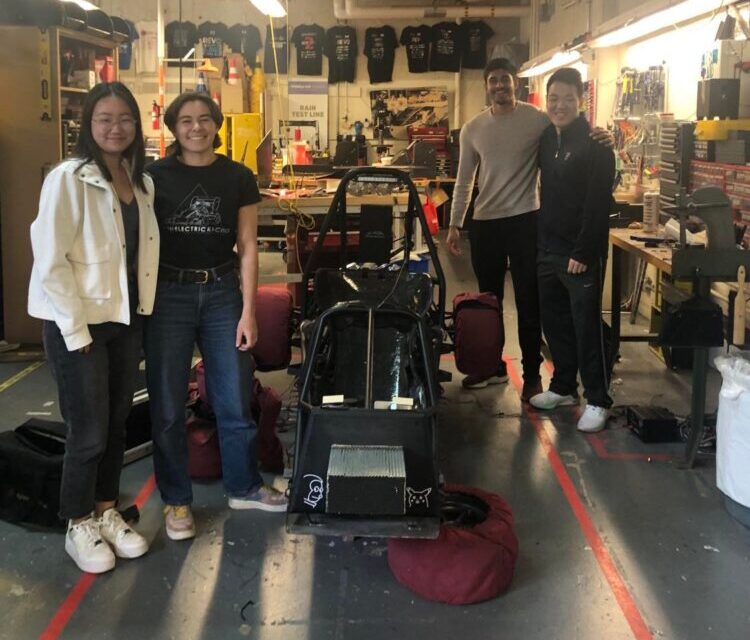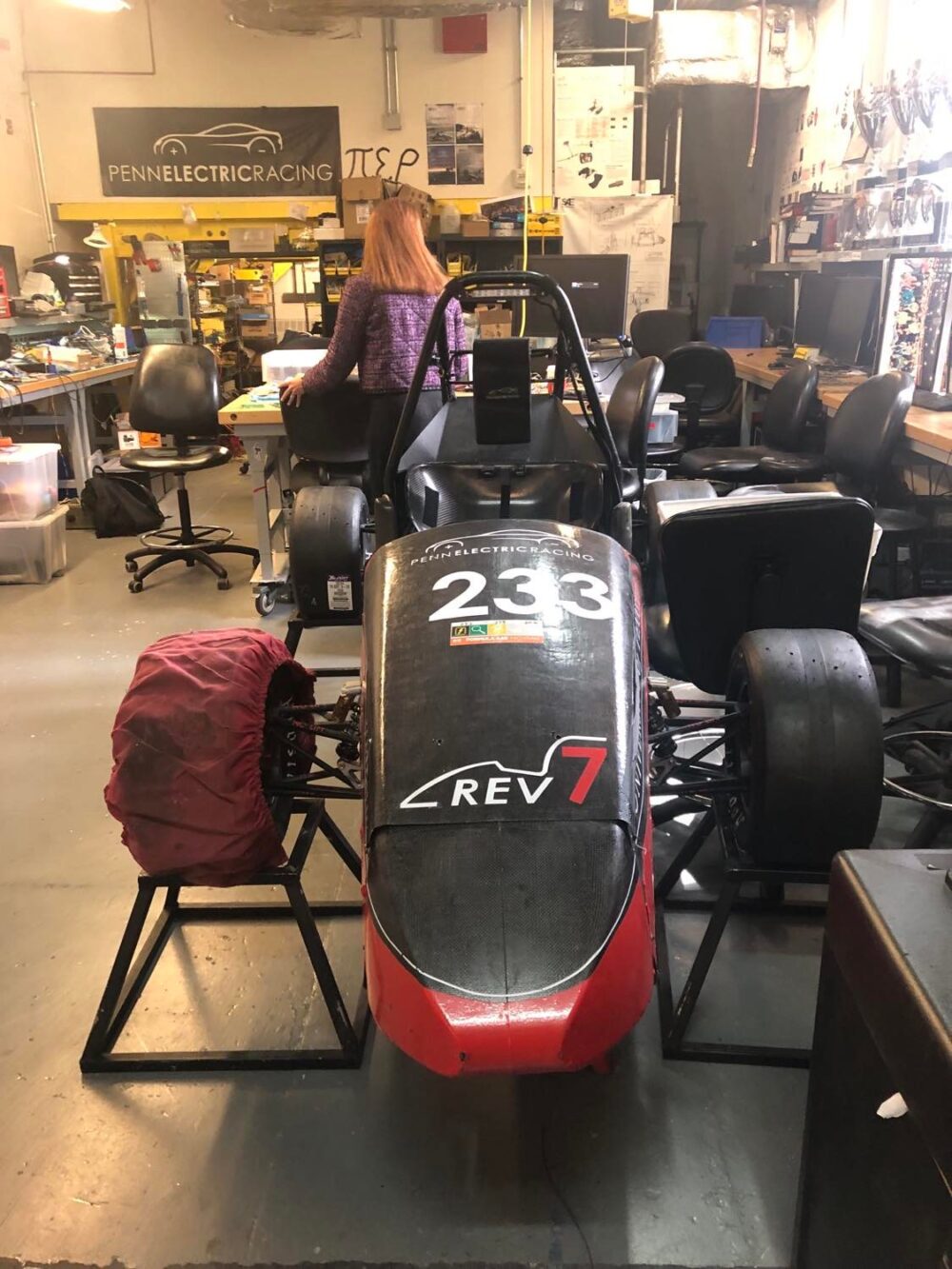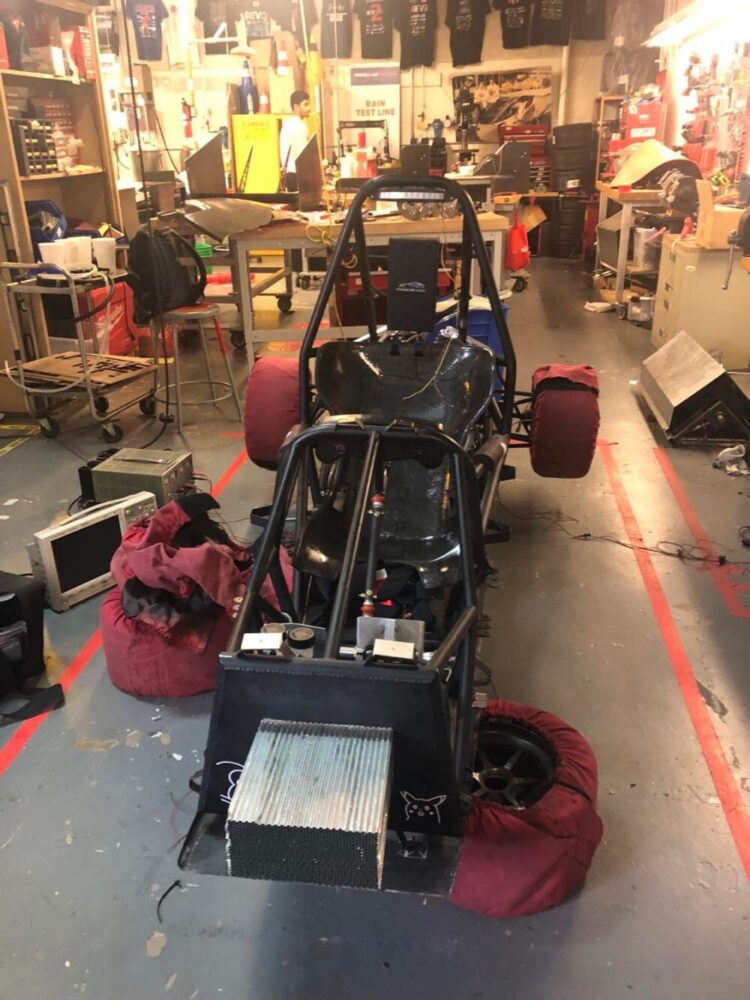But what does it take to build a fully functioning vehicle in just a few months?
The 100 or so members of the Penn Electric Racing team work out of a shop in the basement of the University of Pennsylvania’s Towne Building, where nearly every foot of space is covered by tools, parts and papers. During this reporter’s recent visit, the racecar built by the team last year, Rev7, and the skeleton of 2023’s car, Rev8, sat at the center of the workshop, as students streamed in and out.
Eddy Yang, operations lead for Penn Electric Racing, told Technical.ly that at the beginning of the school year, the team set the goal to finish building the Rev8 by the end of March so they could have time to test it for at least 100 miles before a competition in June. The team officially unveiled the finished Rev8 at an on-campus event on Friday, March 31.

Penn Electric Racing formed in the early 2010s when Penn’s former combustion team, solar racing team and a team that built an electric bike combined. The first car Penn Electric Racing officially built was called Rev0, in 2013, and the team is now on their ninth iteration of that car. (Click here and scroll to see what Rev2 looked like.)
Every year, the team competes at a competition hosted by Formula Society of Automotive Engineers (FSAE) in June, which was held in Michigan in 2022 and will be there again in 2023. FSAE organizes competitions specifically for university teams to design, build and compete race cars. The competition includes static events where teams are judged on their engineering and design decisions, as well as the cost of the car and how well the team works as a “business.” It also includes dynamic events, where the car actually drives to test acceleration, endurance and the like.
Because of the pandemic, many Penn Electric Racing team members hadn’t attended an in-person competition before last year, Yang said. Rev7 did well in 2022’s static events, placing fourth in design and business, but the team wasn’t able to drive the car at competition because they didn’t pass one of the safety tests required to drive the car.
“Everyone was even more motivated after the competition ended to work even harder on Rev8 to build a car that not only looks cool and performs well on paper, but hopefully it will also perform extremely well in competition,” he said.

Penn Electric Racing is split into a mechanical team, electrical team and operations team. The mechanical team is in charge of design, manufacturing and validation of the race car. The electrical team designs circuit boards, writes software and builds electrical systems for the car. The operations team takes care of logistics, procurement, marketing, sponsorship, merchandise and finances for the team.
Year to year, the design of the electrical and mechanical components change based on performance at the past year’s competition and goals set by the team at the beginning of the school year.
“Some systems go through a complete overhaul while others go through an incremental improvement,” Yang said, depending on “what worked well the previous year, what did not work well.” For example, the car’s motor controller was buggy last year, so the team is working on a custom motor controller. In the year leading up to the competition, the team focuses on designing the electrical boards and mechanical components during the fall semester and building the actual car in the spring semester.
So, who actually drives the car? Anyone with a valid drivers license is eligible, per Yang, and they try to give anyone who wants to drive at least one opportunity to do so, but it usually comes down to seniority. At the competition, they consider who was present for testing, who is generally the best driver and who would be the best for certain events.

While the team is largely made up of mechanical engineering and electrical engineering students, Yang said they have people from a variety of majors, including material science, computer science and other types of engineering majors on the two technical teams. The operations team has some business majors and even an English major.
The team has a strong knowledge transfer system between upperclassmen and underclassmen. Once students apply and are accepted onto the team, more experienced members offer lectures to teach the “rookies” about different subjects.
“There definitely is a lot to learn on our team,” Yang said. “It’s a pretty hard job building a race car, but we do provide a lot of support.”
Post-grad, many team members go on to work at big engineering companies or auto manufacturing companies such as Tesla, according to the operations lead. Building a working race car every year gives gives hands-on experience, which complements the content taught in engineering classes.
“If you think of the innovative engineering companies that are making a really positive impact in the world, I think a lot of our members go there,” Yang said. “That’s something that we’re super proud of, because we definitely do gain a lot of real world experience, I think, compared to many other Penn clubs. We’re producing a really hardcore, visible product every single year, and a lot of our members are super dedicated.”







